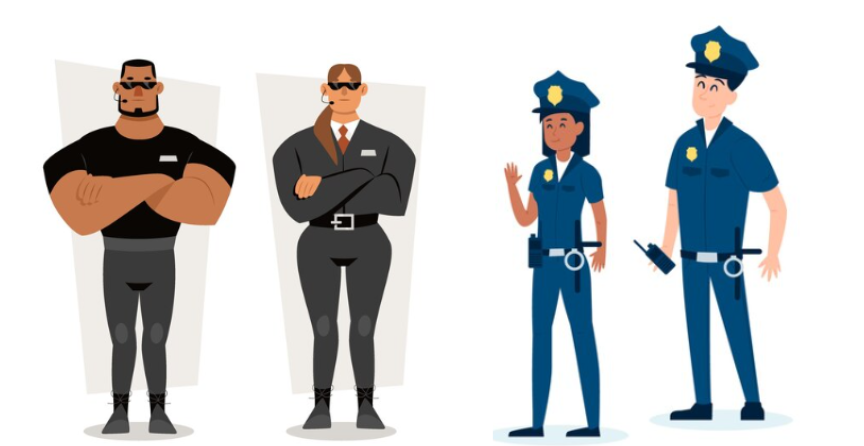In the realm of law enforcement and security, two key figures stand out: security guards and police officers. While both play crucial roles in maintaining public safety and order, there are significant differences in their responsibilities, authority, and training. In this comprehensive guide, we’ll explore the distinctions between security guards and police officers, shedding light on their respective roles, functions, and contributions to safeguarding communities.
Understanding Security Guards
Security guards are private individuals employed by businesses, organizations, or private individuals to protect property, assets, and people. They operate in a wide range of settings, including commercial establishments, residential complexes, hospitals, educational institutions, and events venues. The primary responsibilities of security guards include:
- Surveillance: Monitoring premises through patrols, CCTV systems, and other surveillance methods to deter criminal activity and detect security breaches.
- Access Control: Controlling entry and exit points, verifying credentials, and ensuring only authorized individuals gain access to restricted areas.
- Emergency Response: Responding to security incidents, alarms, and emergencies, such as theft, vandalism, medical emergencies, or fire outbreaks.
- Customer Service: Providing assistance, information, and directions to visitors, employees, and residents, enhancing public safety and customer satisfaction.
Security guards typically do not have the same legal authority as police officers and are limited in their powers of arrest and enforcement. However, they play a vital role in preventing crime, maintaining order, and providing a visible security presence in various environments.
Exploring Police Officers
Police officers are sworn law enforcement officers employed by government agencies, such as municipal police departments, county sheriff’s offices, state police, or federal law enforcement agencies. They are entrusted with upholding laws, enforcing regulations, and protecting public safety. The key duties and responsibilities of police officers include:
- Law Enforcement: Investigating crimes, apprehending suspects, and enforcing laws and regulations to maintain public order and safety.
- Patrol and Response: Patrolling assigned areas, responding to emergency calls, and providing assistance during accidents, crimes, or other incidents.
- Investigation: Conducting criminal investigations, gathering evidence, interviewing witnesses, and preparing cases for prosecution.
- Community Engagement: Engaging with community members, building trust and rapport, and addressing public concerns through community policing initiatives and outreach programs.
Police officers possess the authority to make arrests, issue citations, and use force when necessary to uphold the law and protect citizens. They undergo rigorous training at police academies and must adhere to strict codes of conduct and legal standards in the execution of their duties.
Contrasting Roles and Responsibilities
While security guards and police officers share a common goal of ensuring public safety, there are several key differences between the two roles:
- Legal Authority: Police officers have statutory authority granted by law to enforce laws, make arrests, and use force when necessary, whereas security guards derive their authority from their employer and are limited in their powers of arrest and enforcement.
- Training and Certification: Police officers undergo extensive training at police academies, including firearms training, defensive tactics, and legal education, whereas security guards receive basic training in security procedures, conflict resolution, and emergency response.
- Jurisdiction: Police officers have jurisdictional authority within specific geographical areas governed by their employing agency, while security guards operate on private property or premises where they are employed.
- Accountability: Police officers are accountable to the public and subject to oversight by government agencies, internal affairs departments, and civilian review boards, whereas security guards are accountable to their employers and may face disciplinary action for violations of company policies.
Conclusion
In conclusion, while security guards and police officers both play essential roles in maintaining public safety and security, they operate in distinct capacities with different responsibilities, authority, and training requirements. Security guards primarily focus on protecting property, assets, and individuals within private establishments, while police officers are responsible for enforcing laws, investigating crimes, and maintaining public order within their jurisdiction. By understanding the differences between these two professions, we gain insight into the diverse landscape of security and law enforcement and appreciate the complementary roles they play in safeguarding communities and upholding the rule of law.
For more information about the security services we offer, call us at 1300 170 891.


